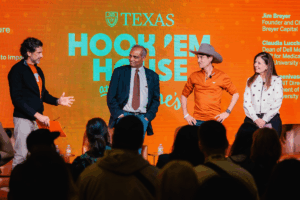AUSTIN, Texas—Researchers at The University of Texas at Austin have received a U.S. Department of Energy (DOE) grant to develop a computer simulation of events that occur in billionths of a second in processes that last for minutes.
Such simulations would be of great value in the development of nano-scale manufacturing—that is, manufacturing at the atomic and molecular scale.
The $1.2 million grant is one of 17 grants for a total of $20 million the DOE awarded to universities and national laboratories to solve complex mathematical problems.
Dr. Tinsley Oden, director of the university’s Institute for Computational Engineering and Sciences (ICES) and associate vice president for research, is the principal investigator heading the interdisciplinary team.
Other researchers involved are: Dr. Grant Willson, professor in the Department of Chemistry and Biochemistry and the Department of Chemical Engineering, Dr. Leszek F. Demkowicz, ICES assistant director and professor in the Department of Aerospace Engineering and Engineering Mechanics, Dr. Jon Bass, ICES deputy director, Dr. Yusheng Feng, ICES research fellow, and Dr. Serge Prudhomme, ICES research scientist.
The team will work to develop a simulation for Willson’s step-and-flash lithography process, which is used in making semiconductors. The process is a low-cost, high-resolution method of imprinting circuit patterns on semiconductors and it shows great promise as a tool in nano-manufacturing.
“Modeling and understanding events that happen at different scales in time and space is a challenge that requires new developments in applied mathematics and immense computer power,” Oden said. “You have to have mathematical theory and methods to transcend these scales. This is relatively unexplored territory. Modeling events that take place over those many scales is probably the hottest topic in computational mathematics at present.”
In the past year, the Texas researchers have produced innovative methods for attacking the problem, Oden said.
“There’s a rigorous mathematical theory behind the methods we have developed that allows one to adaptively change the model,” Oden said. “We have produced a few examples that provided credibility to our proposal.”
The three-year DOE grant formally starts Aug. 15.
For more information contact: Tim Green, 512-475-6596.



